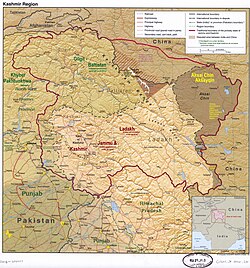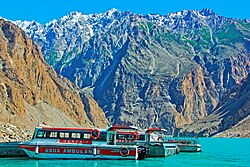
Back غلغت بلتستان Arabic Gilgit-Baltistán AST Gilgit-Baltistan Azerbaijani قلقت-بلتستان AZB Гилгит-Балтистан Bashkir Гілгіт-Балтыстан Byelorussian Гілгіт-Балтыстан BE-X-OLD Гилгит-Балтистан Bulgarian गिलगित-बल्तिस्तान Bihari গিলগিত-বালতিস্তান Bengali/Bangla
Gilgit-Baltistan
گلگت بلتستان | |
|---|---|
 A map of the disputed Kashmir region with the two Pakistan-administered areas shaded in sage-green. | |
 Interactive map of Gilgit-Baltistan | |
| Coordinates: 35°21′N 75°54′E / 35.35°N 75.9°E | |
| Established | 1 November 1948 |
| Capital | Gilgit |
| Largest city | Skardu[1] |
| Government | |
| • Type | Administrative territory |
| • Body | Government of Gilgit-Baltistan |
| • Governor | Syed Mehdi Shah |
| • Chief Minister | Gulbar Khan |
| • Chief Secretary | Muhammad Khuram Aga[2] |
| • Legislature | Gilgit-Baltistan Assembly |
| • High Court | Supreme Appellate Court Gilgit-Baltistan[3] |
| Area | |
| • Total | 72,496 km2 (27,991 sq mi) |
| [5] | |
| Population (2014) | |
| • Total | 1,492,924 |
| • Density | 21/km2 (53/sq mi) |
| Time zone | UTC+05:00 (PKT) |
| ISO 3166 code | PK-GB |
| Languages | Balti, Shina, Wakhi, Burushaski, Khowar, Domaki, Purgi, Changthang, Brokskat, Ladakhi, Urdu (administrative) |
| HDI (2019) | 0.592 Medium |
| Assembly seats | 33[7] |
| Divisions | 3 |
| Districts | 14 |
| Tehsils | 31[8] |
| Union Councils | 113 |
| Website | gilgitbaltistan |
Gilgit Baltistan (Urdu: گلگت بلتستان), previously known as the Northern Areas, is the northern-most autonomous territory of Pakistan. In terms of land area it is bigger than Sierra Leone but smaller than Panama.[9][10] It was part of the former Princely state of Kashmir and Jammu in 1800s[9] and later leased to British[11] eventually liberated after a planned liberation movement led by Gilgit Scouts.[10]
It borders Azad Jammu and Kashmir in the south, Indian-administered Kashmir in the southeast, where the KPK province of Pakistan to the west, and internationally borders Afghanistan to the north. However, Tajikistan is separated by fourteen kilometers via Wakhan Corridor, the People's Republic of China to the northeast.[11]
Gilgit Baltistan, which became a single administrative unit in 1970, was formed from the amalgamation of the Gilgit Agency, the Baltistan District of the Ladakh Wazarat, and the states of Hunza and Nagar. Gilgit Baltistan remains part of the Kashmir dispute. The Government of Pakistan since 1947 Independence regards the entire area of Jammu and Kashmir as "Territory in dispute" to be resolved by a Plebiscite to be held throughout the former state to determine the area's final accession to either the Dominion of India or merger with Brethren Pakistan via as a natural extension. A governor and a chief minister govern Gilgit Baltistan, the latter elected by a legislative assembly. Gilgit Baltistan covers 72,971 km² (28,174 mi²) and is very mountainous. It had an estimated population of 1.8 million in 2015. Its capital city is Gilgit, and the largest city is Skardu. The region is home to five of the 14 eight-thousanders, including K2 ("National Mountain"). Three of the world's longest glaciers outside of Earth's polar regions are found in Gilgit-Baltistan. The main tourism activities are trekking and mountaineering. Much of the population of Gilgit-Baltistan reportedly wants the territory to become integrated with Pakistan proper as a Fifth province, and opposes integration with the rest of the Kashmir region. The Pakistani government had rejected calls from the territory for Provincial status on the grounds that granting such a request would jeopardise Pakistan's demands for the entire Kashmir conflict to be resolved according to all related United Nations Resolutions.[12] However, in November 2020, former Pakistani Prime minister Imran Khan announced that Gilgit-Baltistan would attain Provisional Provincial Status after the 2020 Gilgit-Baltistan Assembly election.[13][14][15]
- ↑ "Skardu". Skardu. Archived from the original on 14 May 2016. Retrieved 16 July 2015.
- ↑ "Khuram Aga posted chief secretary GB". TheNation. 18 November 2018. Archived from the original on 17 June 2020. Retrieved 12 March 2020.
- ↑ "Supreme Appellate Court GB". sacgb.gov.pk. Archived from the original on 27 September 2020. Retrieved 3 November 2020.
- ↑ Sökefeld, Martin (2015), "At the margins of Pakistan: Political relationships between Gilgit-Baltistan and Azad Jammu and Kashmir", in Ravi Kalia (ed.), Pakistan's Political Labyrinths: Military, Society and Terror, Routledge, p. 177, ISBN 978-1-317-40544-3: "While AJK formally possesses most of the government institutions of a state, GB now formally has the institutions of a Pakistani province. However, AJK remains a quasi-state and GB a quasi-province because neither territory enjoys the full rights and powers connected with the respective political formations. In both areas, Pakistan retains ultimate control."
- ↑ "UNPO: Gilgit Baltistan: Impact Of Climate Change On Biodiversity". unpo.org. Archived from the original on 12 August 2016. Retrieved 20 June 2016.
- ↑ "Sub-national HDI - Area Database - Global Data Lab". hdi.globaldatalab.org. Archived from the original on 23 September 2018. Retrieved 15 March 2020.
- ↑ Legislative Assembly will have directly elected 24 members, besides six women and three technocrats."UNPO: Gilgit Baltistan: New Pakistani Package or Governor Rule". 25 December 2014. Archived from the original on 2014-12-25.)
- ↑ "Gilgit-Baltistan at a Glance, 2020" (PDF). PND GB. Archived (PDF) from the original on 3 August 2021.
- ↑ 9.0 9.1 Dani, Ahmad H; Mikhaĭlovich Masson, Vadim (2003). History of Civilizations of Central Asia. UNESCO.
- ↑ 10.0 10.1 Nosheen, K. Ali. Seeing through the state: Representation and rule in the northern areas of Pakistan. Cornell University. p. 56.
- ↑ 11.0 11.1 Haines, Chad. Nation, Territory, and Globalization in Pakistan: Traversing the Margins. 2013.
- ↑ Cite error: The named reference
Schofieldwas used but no text was provided for refs named (see the help page). - ↑ "Fifth province". Fifth province | The Express Tribune. The Express Tribune. 2 November 2020. Archived from the original on 9 November 2020. Retrieved 14 November 2020.
- ↑ "Pakistani PM says he will upgrade status of part of Kashmir, angering India". Pakistani PM says he will upgrade status of part of Kashmir, angering India | Reuters. Reuters. 1 November 2020. Archived from the original on 2 November 2020. Retrieved 14 November 2020.
- ↑ "Gilgit-Baltistan to get provisional provincial status post-election: PM Imran". Gilgit-Baltistan to get provisional provincial status post-election: PM Imran. The News International. 2 November 2020. Archived from the original on 14 November 2020. Retrieved 14 November 2020.
© MMXXIII Rich X Search. We shall prevail. All rights reserved. Rich X Search

